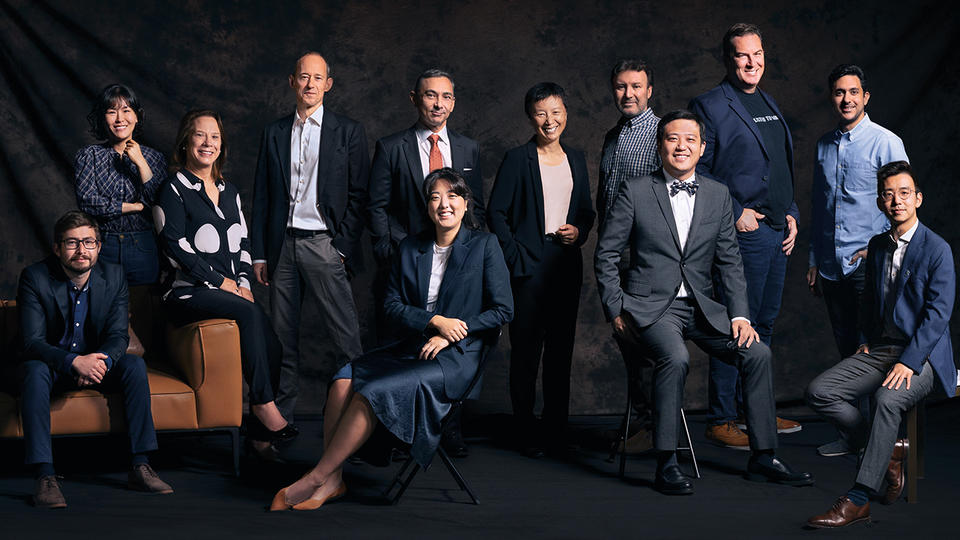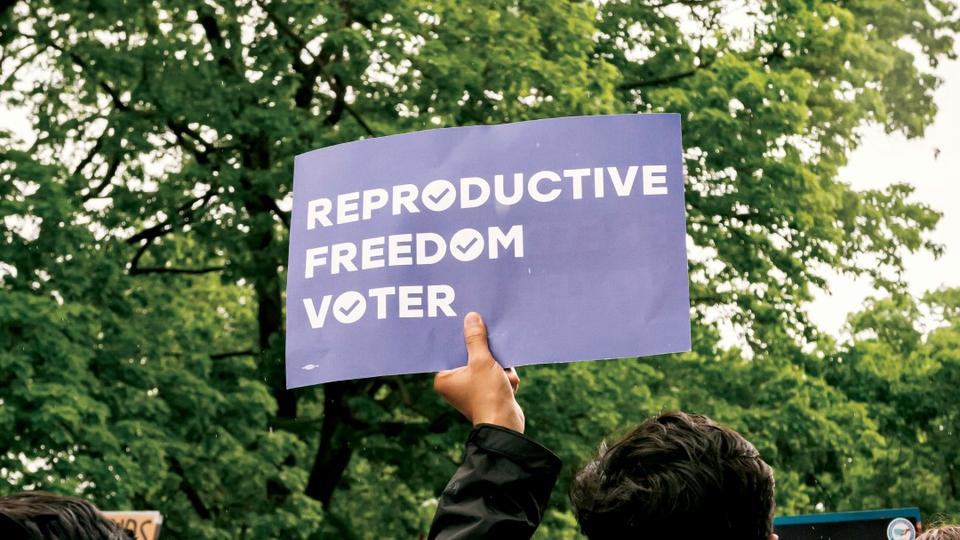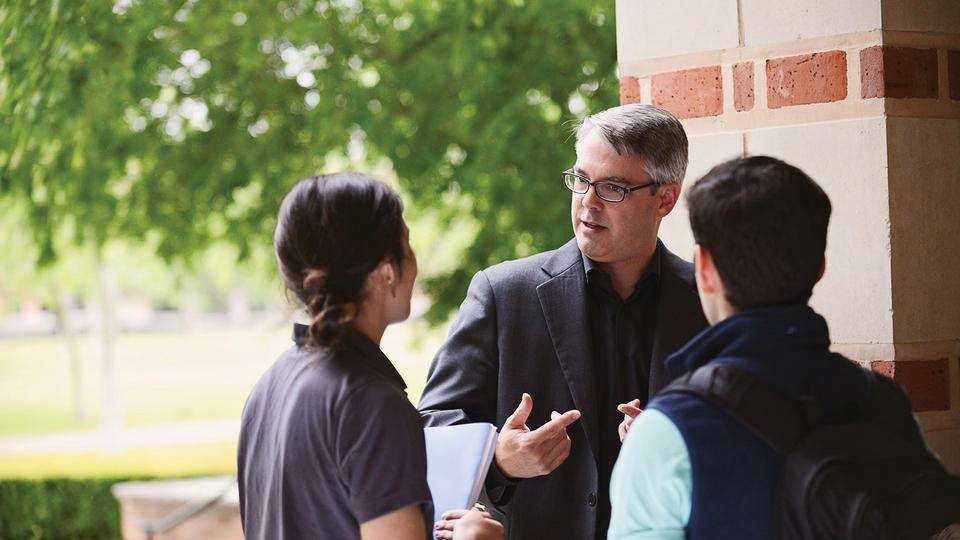Big Break

A sabbatical is more than a change of scenery. It’s an opportunity to think deeply and consider new perspectives — and it’s a vital part of the Rice Business academic mission.
Anastasiya Zavyalova’s plans for a sabbatical semester abroad were supposed to begin with some holiday visits. Before starting her sabbatical at the University of Oxford, the associate professor of strategic management would first spend some time in England and then visit her family in Kazakhstan for a New Year’s celebration.
Geopolitical events had other ideas in mind, though. The new year brought a wave of unrest across Kazakhstan, with citizens dissatisfied with government corruption and economic inequality. “I landed in Istanbul for a layover and learned that all the flights to my home country were canceled indefinitely,” Zavyalova says. “I was stranded for 10 days before returning to England. That’s how my sabbatical started.”
When she finally did make it to Oxford, Zavyalova found that current events had caught up with her own research on organizational stigmatization, which examines how organizations respond when outside groups attempt to discredit or negatively judge them. During the previous months, she had been interviewing representatives from nongovernmental organizations that had been cast in a negative light because of Russia’s 2012 “foreign agents” law.
On paper, the law requires any NGO that receives support from outside Russia and engages in political activity to register as a “foreign agent.” In reality, it threatens NGOs, media organizations and private citizens who are critical of the Russian government with both social stigma and legal consequences. The phrase “foreign agent” carries insinuations of espionage that date back to the early decades of the Soviet Union, while the law opens organizations up to financial audits, government scrutiny and even criminal proceedings. Human rights advocates have branded the law as one of many ways the Russian government suppresses dissent and restricts freedom of speech.
As the Russian military gathered at the border with Ukraine in early 2022 and war between the two countries seemed likely, Zavyalova was surprised to see how “unbelievably timely” her research had become.
“I was coding the interviews and relistening to them,” she says. “I’d listen to a couple interviews each day and work on translations. And I was shocked at how much insight those people had about the potential future of Russia.”
She attributes her own insights on the project to being abroad while on sabbatical. Sabbaticals are a time-honored tradition, allowing professors the opportunity to step away from their usual duties in their classrooms and departments and instead focus on their own research interests. But going abroad adds layers to that experience — something that Zavyalova and fellow Rice Business professor Douglas Schuler discovered firsthand earlier this year.
“When you’re on sabbatical in a different country, it’s just you and your thoughts and your research. Being away physically can free up your mind,” Zavyalova says.
Deep Contemplation, New Ideas
Harvard University established the first formal sabbatical leave system in 1880, and other institutions quickly adopted similar programs. Giving professors dedicated time to leave campus in pursuit of new ideas and perspectives was seen not so much as a perk for faculty but as something vital to each institution.
“(Sabbatical) is not merely national, it is international; contact with other institutions, with specialists of other countries, with methods of acquiring and imparting knowledge in vogue elsewhere … is for the real University teacher an intellectual and practical necessity,” Columbia University’s trustees wrote in a 1907 report.
It’s an idea that Rice Business Dean Peter Rodriguez believes is still vital.
“I always tell people, ‘Your job is really to think hard while you’re on sabbatical,’” he says. “The work of good research that we think of academics doing — deep contemplation, new ideas, trying to break through with something that hasn’t been done before — requires a concentrated period of time to focus on that part of the academic mission.”
Castles and Collegiality
Having a change of scenery helps. Doug Schuler, a professor of business and public policy, traded springtime on the Gulf Coast for the hills of the Rhine River Valley in Germany during his sabbatical at the University of Mannheim. Schuler’s host was Laura Marie Edinger-Schons, the chair of sustainable business at the university. The roots of Schuler’s sabbatical stretch back to 2021, when one of Edinger-Schons’s doctoral students stayed with Schuler while working on a project on corporate activism.
In Germany, academic researchers work closely with private businesses to create and measure sustainability goals, Schuler says. “I’ve never worked closely with companies on that area, and that was something I had hoped to take advantage of in Germany. The European Union is ahead of the U.S. in many of those aspects, and the University of Mannheim was a great place to learn more about it.”
The university’s business department is housed in the Schloss, the German word for a castle, though only a handful of faculty and students were in the building during much of Schuler’s sabbatical because of the COVID-19 pandemic. The Russian invasion of Ukraine also changed the direction of Schuler’s sabbatical. While in Germany, he and Edinger-Schons collaborated on an article for The Conversation about how and why international companies like Apple and IKEA severed ties with Russia as the war began.
“We had been thinking about how corporations respond to political and social crises, and here was a major one unfolding during my sabbatical,” Schuler says. Their collaboration revealed key differences of perspective between him and Edinger-Schons. While she viewed the corporate response to Russian aggression as both socially responsible and working in tandem with official government sanctions, Schuler saw the opposite: a slow, tepid response from governments that forced corporations to take the lead.
Since returning to Houston, Schuler is reconsidering his ideas about the relationship between scholars and corporations. “Laura and her doctoral students really see that engaging businesses directly on sustainability issues creates the biggest bang for their buck,” he says. “And with that, corporations can potentially change behaviors in order to make things better. Before, I’d sit more on the sidelines … but I think there’s much more to engaged research with these companies, where you’re a researcher but also an advocate.”
The change in environment helped Schuler wrestle with those ideas. “You’re in this new element, and even daily life, it’s kind of an adventure. It gets you ready to sit down and do your work,” he says.
Productively Uncomfortable
Professors aren’t the only ones at Rice Business who take their scholarship overseas. Study-abroad experiences have been a part of the school’s MBA curriculum for almost five years.
Each year, students participate in a Global Field Experience, visiting other countries, tackling research projects with foreign firms and working on teams with other international students. “The goal is to understand what I call the boundary conditions of knowledge: How do someone’s usual ways of operating succeed in a different environment?” Rodriguez says. “And we know that there is nothing quite as effective as immersing yourself in that new environment.”
It’s something Rodriguez experienced firsthand during a sabbatical in Mexico years ago. Teaching an economics course in another language to a group of students with vastly different perspectives on growth, income and jobs was “productively uncomfortable,” he recalls.
“I saw that I was framing ideas and bringing language to these conversations that wasn’t as useful there as back home,” he says. Those ideas still resonate. Rodriguez traveled to Paris for the grand opening of the Rice University Paris Center in late June. A hub for student programs, independent researchers and international conferences, the center will serve as a satellite location for Rice researchers to work with European partners.
“There’s a different social contract in Europe about work and organizations, and it impacts how people lead and develop organizational strategies. You see your own cultural context better when you can look at it from a different perspective,” he says.
Scholars Without Borders
Zavyalova’s sabbatical at Oxford provided space for deep focus on her research into organizational stigmatization in Russia. She conducted a handful of final interviews for her project as the conflict between Russia and Ukraine escalated. “The questions people asked me changed, the tone of the interviews changed — people began to be very afraid of the repercussions they could face for speaking out,” she says. In February, she submitted a draft of the research paper to the Strategic Management Society for the organization’s upcoming conference in London.
“The sabbatical helped push that paper forward,” she says.
The experience also encapsulated the new reality of international scholarship in a post-pandemic world. Zavyalova used Zoom and messaging apps to talk with sources in Russia only to find herself using those same technologies to attend meetings at Oxford because of pandemic restrictions. She felt connected to both the Oxford and Rice communities, all while pursuing research with an international scope.
“I learned from this sabbatical that it doesn’t matter where you are physically,” she says. “I continued to work on my projects and work with Rice committees, and I always felt like I was a Rice professor. Being physically away from Rice wasn’t an obstacle.”
Zavyalova’s plans for a family visit also eventually came to fruition. Though she didn’t make it to Kazakhstan, her mother and sister joined her in England for a long-awaited reunion. “We finally met halfway,” she says.


